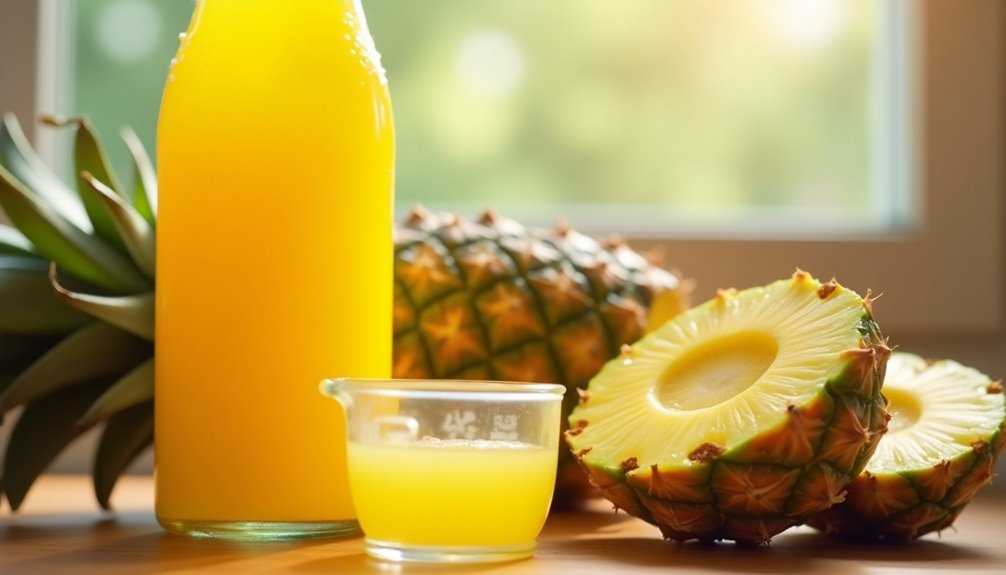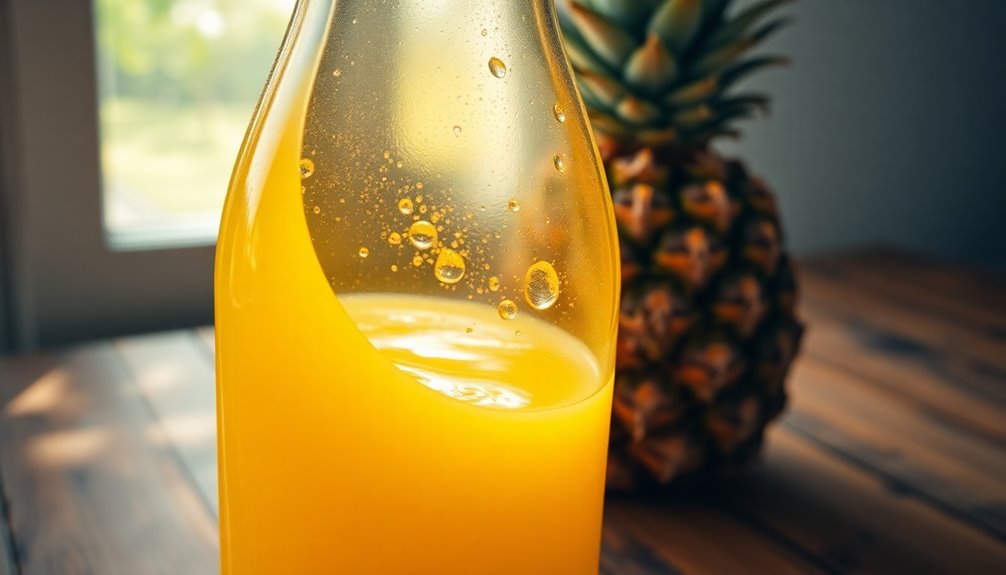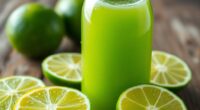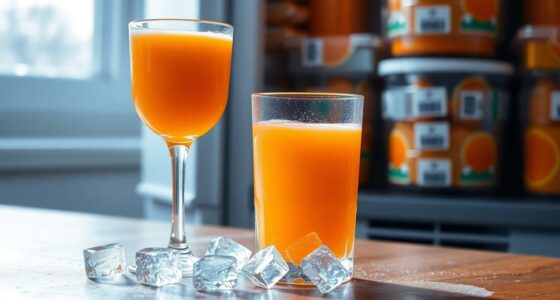Opened pineapple juice lasts about 7 to 10 days in the fridge, but for the best taste, try to use it within the first week. Refrigerate it right after opening and store it in an airtight container to keep it fresh. Always check for off odors, unusual flavors, or visible mold before using it. If you're curious about how to make the most of your leftover juice, there are plenty of ideas to explore.
Key Takeaways
- Opened pineapple juice can last 7 to 10 days when refrigerated continuously.
- For optimal quality and flavor, consume the juice within the first week after opening.
- Store juice in an airtight container to preserve freshness better than the original packaging.
- Signs of spoilage include off odors, unusual flavors, and visible mold growth; discard if detected.
- Fresh juice enhances taste; prioritize consuming it promptly for the best experience.

When you open a bottle of pineapple juice, you might wonder how long it'll stay fresh in your fridge. The good news is that opened pineapple juice can last about 7 to 10 days when you store it correctly. To keep it fresh and tasty, you need to refrigerate pineapple juice immediately after opening. This continuous refrigeration is essential to maintain its quality and flavor.
One of the keys to prolonging the shelf life of opened pineapple juice is to store it in an airtight container. The original packaging may not always provide the best seal once opened, so transferring the juice to a container that seals tightly can help keep out air and bacteria. This simple step can make a significant difference in how long your juice stays fresh.
Remember, exposure to air can accelerate spoilage, so an airtight container is your best friend in preserving that delightful pineapple flavor.
As you enjoy your juice, it's vital to keep an eye out for spoilage signs. If you notice any off odors, unusual flavors, or visible mold growth, it's a clear indication that your pineapple juice has gone bad. Trust your senses; if the juice smells or tastes different from when you first opened it, it's best to err on the side of caution and discard it.
While it might be tempting to try and finish that last bit of juice, consuming spoiled products can lead to unpleasant experiences.
For optimal quality, it's advisable to consume opened pineapple juice within the first week. While it may technically last up to 10 days, the flavor and freshness are often best within those initial days. If you want to maximize your enjoyment, try to finish the juice in that timeframe. You'll find that the taste is more vibrant and refreshing, which is what you want from a tropical beverage.
If you happen to have leftover pineapple juice, consider incorporating it into recipes or using it in smoothies. This way, you can enjoy its sweet and tangy flavor without worrying about it going to waste.
But always remember to check for spoilage signs before using it in any dish.
Frequently Asked Questions
How Long Is Pineapple Juice Good Once Opened?
Once you open pineapple juice, it's good for about 7 to 10 days if you store it properly in the fridge.
Make sure you keep it consistently refrigerated to maintain freshness. If you notice any off odors, weird flavors, or mold, it's best to toss it.
For longer storage, you can freeze the juice, where it’ll last 8 to 12 months. Always use an airtight container to keep it fresh! To thaw frozen juice, simply transfer it to the refrigerator a day before you plan to use it, ensuring it retains its flavor and nutritional quality. Many people wonder, how long can opened juice last once it’s refrigerated? Typically, opened juice can be safely stored in the fridge for about 7 to 10 days, as long as it’s kept in a sealed container.
How to Know if Pineapple Juice Is Spoiled?
Picture a sunny kitchen, the sweet scent of pineapple filling the air.
But if you notice a sour odor or a darker hue in your juice, it's time to be cautious.
Bubbles or cloudiness can signal fermentation, while a thick, gloopy texture is a red flag.
And if you spot mold or a bulging container, don't hesitate—discard it immediately.
Trust your senses; they'll guide you to ensure your drink is safe.
How Long Does Del Monte Pineapple Juice Last After Opening?
When you open a carton of Del Monte pineapple juice, it typically lasts for 7 to 10 days in your fridge.
To keep it fresh, store it in an airtight container. Continuous refrigeration helps slow spoilage, ensuring you enjoy its quality.
Always check for spoilage signs, like off smells or visible mold, before drinking.
If you want to keep it longer, consider freezing it, which can extend its shelf life to 8 to 12 months.
Can Pineapple Juice Be Bad?
Imagine a vibrant garden, where fruits thrive in the sun. Yet, even the sweetest pineapple can wither if neglected.
Yes, pineapple juice can go bad. If you notice a sour smell, strange taste, or any mold, it's time to toss it. Leaving it out too long makes it unsafe, regardless of how it looks.
Always trust your senses and check for changes; your health deserves that attention. Keep your juice fresh!
Conclusion
In conclusion, once you open that bottle of pineapple juice, it'll last about 5 to 7 days in the fridge. Did you know that 1 cup of pineapple juice contains about 80 calories, making it a sweet and nutritious option? So, enjoy your juice while it's fresh, and don't forget to check for any changes in smell or taste. With a little care, you can savor that tropical flavor for a few more days!
Cindy thoroughly researches juicing trends, techniques, and recipes to provide readers with practical advice and inspiration. Her writing style is accessible, engaging, and designed to make complex concepts easy to understand. Cindy’s dedication to promoting the advantages of juicing shines through her work, empowering readers to make positive changes in their lives through the simple act of juicing.
















